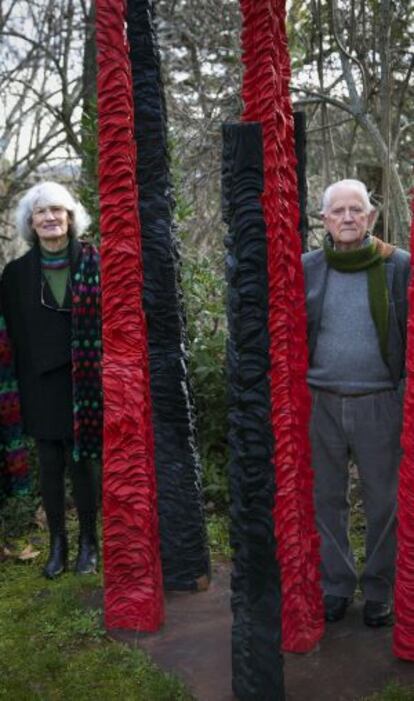After 50 years at the vanguard, a garden of artistic delights
The founders of the pioneering Galería Edurne celebrate by fulfilling a dream


The lawn at number 52, Avenida de la Constitución, in El Escorial, is a place where people plant art, not flowers. Fifty years after opening their first gallery, the Galería Edurne, Margarita de Lucas and Antonio de Navascuás have fulfilled one of their dreams: to create a sculpture garden.
Now, the work of national and international creators adorns the residence of these Spanish pioneers of contemporary culture.
"Art is a life experience, not a possession," explains De Lucas, standing in front of one of the open-air artworks: three iron pillars holding up a chaos of structures that seem to sail through the air. They are The Floating Homes, by Fernando Suárez.
The sculpture garden was born out of the couple's experiences abroad, and mirrors the Insel Hombroich Museum in Germany and the Galerie Maeght in France, where art and nature blend in perfect symbiosis. Here, as there, the rain, wind and sun breathe life into sculptures that would otherwise remain static in an indoor setting.
De Lucas and De Navascuás focused early on in their career on artists who were doing "something different." They get passionate as they think back upon the great contemporary artists whose work has hung on their own walls: Jordi Teixidor, Enrique Salamanca, Manolo Millares and Luis Gordillo, whom they introduced to Spanish gallery-goers in 1964, when nobody was paying attention to him yet.
The crisis is one thing, but this ostracism they are condemning us to is quite another"
There's been time for a lot over these last 50 years. De Navascuás says that theirs was the first eclectic gallery in Spain, and reveals that they were forced to "grease the palm" of a police officer so he would look the other way while they were refurbishing their first space, a semi-basement in downtown Madrid. "Things worked like that back then," he shrugs.
There were good times in the 1960s and then in the 1980s, but the pair say it is a "miracle" that their business has survived this long.
Both also seem angry at how painting, sculpture and cultural innovation in general seem to have been relegated to the back burner in Spain. "Being an artist is a heroic endeavor," argues De Lucas, who is seriously critical of the system and of what she sees as the failures of education and society. "The economic crisis is one thing, but the ostracism that they are condemning us to is another."
The figures leave little room for doubt: contemporary art sales dropped 62 percent in 2012, according to the publication Artprice.
And so gallery owners who have spent time with the likes of Jorge Oteiza and Eduardo Chillida watch helplessly as Spanish artists move abroad to seek the kind of recognition that is "unthinkable here."
"It's something congenital to Spaniards, this inability to recognize our own worth," sighs De Lucas.
De Navascuás says art is also in crisis, but with itself. The artist, he says, should be constantly questioning creation itself, the concept, to avoid falling into monotonous conventionalism.
"'Galería Edurne is like the source of the Guadiana River, which appears and disappears,' the critic Fernando Huici once said, and he was right," jokes De Navascuás. The gallery has had nine different locations over the decades. Will the current premises in El Escorial be the definitive ones? "Who knows..?"
Tu suscripción se está usando en otro dispositivo
¿Quieres añadir otro usuario a tu suscripción?
Si continúas leyendo en este dispositivo, no se podrá leer en el otro.
FlechaTu suscripción se está usando en otro dispositivo y solo puedes acceder a EL PAÍS desde un dispositivo a la vez.
Si quieres compartir tu cuenta, cambia tu suscripción a la modalidad Premium, así podrás añadir otro usuario. Cada uno accederá con su propia cuenta de email, lo que os permitirá personalizar vuestra experiencia en EL PAÍS.
¿Tienes una suscripción de empresa? Accede aquí para contratar más cuentas.
En el caso de no saber quién está usando tu cuenta, te recomendamos cambiar tu contraseña aquí.
Si decides continuar compartiendo tu cuenta, este mensaje se mostrará en tu dispositivo y en el de la otra persona que está usando tu cuenta de forma indefinida, afectando a tu experiencia de lectura. Puedes consultar aquí los términos y condiciones de la suscripción digital.








































